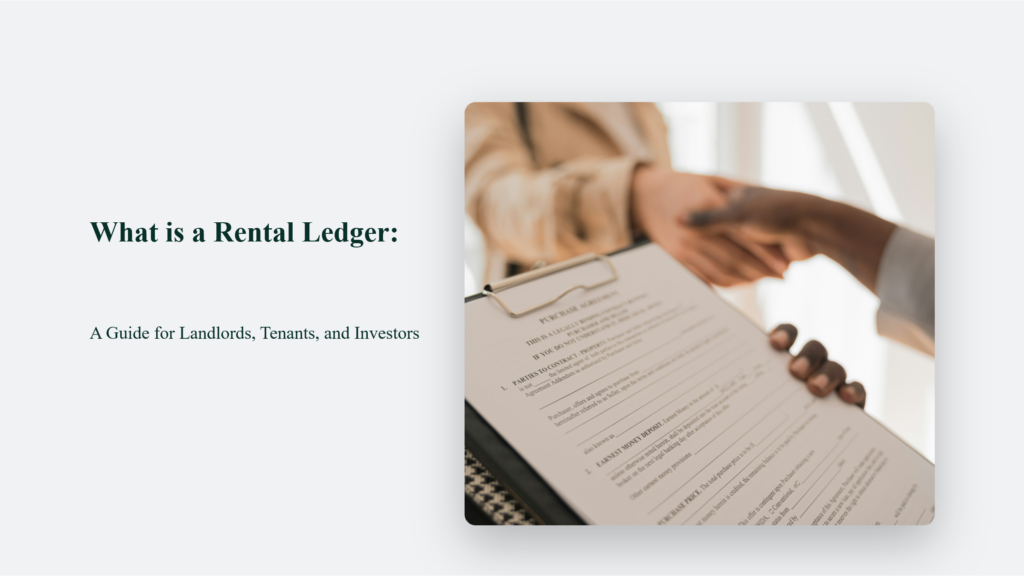Have you ever found yourself swimming in a sea of rental receipts, struggling to track who paid what and when? If so, let me introduce you to your new best friend in property management: the rental ledger. This unsung hero might just be the lifesaver you didn’t know you needed in the choppy waters of real estate. So, what is a rental ledger, you ask? Let’s find out.

What is a Rental Ledger?
Picture this: a ledger, not unlike those used by old-timey bookkeepers, but this one is dedicated solely to keeping track of rental payments. Think of it as a financial diary for your property. This ledger records the date, amount, and specifics of each rent payment, along with additional charges like late fees or utilities, if applicable. It’s a snapshot of your property’s financial health and tenant payment behaviour all in one place.
A Tool for Everyone in the Rental Game
A rental ledger is an essential tool in the rental industry, providing significant benefits for various stakeholders, including landlords, property managers, tenants, investors, and lenders. Here’s an in-depth look at how each of these groups can utilize a rental ledger:
For Landlords and Property Managers
A rental ledger for landlords and property managers is akin to a financial GPS. It’s a comprehensive record of rental transactions that offers several benefits:
- Monitoring Rent Payments: It helps in tracking when and how much rent is paid, providing a clear view of the property’s income stream.
- Identifying Late Payments: The ledger assists in quickly spotting delays in rent, enabling timely follow-ups.
- Managing Cash Flow: By tracking rental income and expenses, landlords can better manage their property’s cash flow, which is crucial for maintaining profitability.
- Support in Legal Situations: In cases of eviction or other disputes, a rental ledger acts as an authoritative record of payment history.
- Facilitates Communication: It can be a reference point in discussions with tenants about their payment history.
For Tenants
For tenants, a rent ledger serves as a personal record-keeping tool that offers several advantages:
- Proof of Payment: It is evidence of rent paid and is useful in disputes over payment history.
- Monitoring Payment History: Tenants can track their rent payments over time, ensuring they’re up-to-date with their obligations.
- Enhances Rental Applications: A clean payment history in the ledger can be beneficial when applying for new rentals, demonstrating reliability to potential landlords.
- Dispute Resolution: In cases of alleged non-payment or late fees, tenants can use the ledger to clarify and resolve issues.
For Investors
Investors find rental ledgers particularly useful in evaluating the financial performance of a property:
- Insight into Property Performance: It provides a clear view of the rental income, helping to assess the property’s profitability.
- Identifying Trends: Trends in rental payments, such as consistent late payments or vacancies, can highlight potential issues that may affect the value of the investment.
- Evaluating Potential Investments: When considering new investments, investors can use ledgers to gauge properties’ financial health and potential ROI.
For Lenders
Lenders rely on rent ledgers for various reasons:
- Assessing Loan Applications: The ledger provides insight into the property’s cash flow, which is critical for evaluating loan applications.
- Determining Risk: Lenders can assess the risk associated with the property based on consistent rental income and tenant stability, as shown in the ledger.
- Verifying Income Statements: It serves as a verification tool for income and expense statements provided by the property owner.
Why Rent Ledgers are More than Just a Fancy List
The concept of a rent ledger transcends its basic function as a list, offering a multifaceted utility in property management. This significance can be explored through five key aspects:
Financial Management:
A rent ledger resembles a financial crystal ball for rental properties. It doesn’t just record transactions; it provides a holistic view of the property’s financial health. Detailing income from rent and other charges helps landlords and property managers forecast future cash flows and plan for upcoming expenses. This comprehensive financial picture is crucial for making informed decisions about the property.
Record Keeping:
The rent ledger functions like a meticulous librarian for your financial records. It organizes all rental transactions chronologically, ensuring every penny is accounted for. This level of organization is not just about neatness; it’s about having a reliable and quick reference for every financial interaction related to the property. It can be especially useful during financial audits or in resolving disputes.
Legal Compliance:
In legal contexts, a rent ledger serves as a shield, offering documented evidence of financial transactions between landlord and tenant. This ledger can be a pivotal piece of evidence in disputes or legal proceedings, such as eviction cases, demonstrating payment histories and contractual compliance or breaches.
Improved Relations:
Transparency is the cornerstone of any healthy landlord-tenant relationship. The rent ledger’s clear and transparent record of transactions minimizes misunderstandings and disputes. It fosters trust and accountability, creating a harmonious rental experience. By having an accurate account of financial exchanges, both parties can engage in discussions and negotiations with a clear understanding of the financial aspects of the tenancy.
Simplifies Reporting:
A rent ledger can be a lifesaver when it comes to tax time. It streamlines the financial reporting process by providing an easy-to-follow rental income account. This simplification is not just a matter of convenience; it ensures accuracy in income declaration, which is essential for tax compliance.

Setting Up Your Own Rent Ledger
Setting up your own rent ledger is crucial in managing your rental property effectively. The process is straightforward and can be customized to fit your specific needs. Here are the steps and key elements to consider when creating a rent ledger:
Choose the Right Format
- Physical Ledger: Traditional but effective, a physical ledger is a bound book where transactions are manually recorded. It’s tangible, straightforward, time-consuming, and less efficient for quick searches or aggregations.
- Digital Spreadsheet: Tools like Microsoft Excel or Google Sheets offer flexibility and efficiency. They allow for easy calculations and updates and can be accessed from anywhere. Plus, you can use templates to get started.
- Property Management Software: Consider property management software for a more automated approach. These platforms can track payments, generate reports, and even integrate with other financial tools.
Essential Details to Include
Property Information:
- Name and address of the property.
- Type of property (e.g., single-family, multifamily, etc.).
- Details like the number of bedrooms and bathrooms.
Tenant Information:
- Tenant’s name.
- Lease start and end dates.
- Monthly rental rate.
Transaction Records:
- Date of each transaction.
- Description (e.g., monthly rent, late fee, security deposit).
- Amount due and amount paid.
- Running balance or remaining balance.
Additional Notes:
- Details on partial payments or adjustments.
- Notes on communication with tenants regarding payments.
- Any other relevant information that might impact financial records.
Best Practices for Maintenance
- Regular Updates: Ensure the ledger is updated promptly after each transaction. It helps in maintaining accurate and current records.
- Accuracy is Key: Double-check entries for errors. Mistakes in the ledger can lead to financial discrepancies and disputes.
- Secure Storage: Whether it’s a physical ledger or a digital file, ensure it’s stored securely. For digital ledgers, back up the data regularly.
- Legal Compliance: Be aware of legal requirements for record-keeping in your jurisdiction, especially for potential legal disputes or tax purposes.
Benefits of a Well-Maintained Rent Ledger
- Financial Oversight: Provides a clear picture of the financial health of your property.
- Dispute Resolution: Acts as a reliable record in case of disagreements over payments.
- Tax Preparation: Simplifies the process of preparing and filing taxes.
- Property Management: Assists in making informed decisions about property maintenance, rent adjustments, and tenant relationships.
So, there you have it – your guide to navigating the world of rental ledgers. Next time you’re drowning in rental receipts, remember that a well-organized rental ledger is a life raft waiting for you. Happy sailing in the sea of property management!
The Bottom Line:
So, there you have it – your guide to navigating the world of rental ledgers. Next time you’re drowning in rental receipts, remember that there’s a life raft waiting for you in the form of a well-organized rental ledger. Happy sailing in the sea of property management!
Frequently Asked Questions:
Is there a better alternative to a traditional rent ledger?
Yes, property management software can automate the process and save you from manual record-keeping.
How long should I keep my rent ledgers?
It’s recommended to keep them for six to seven years for record-keeping and legal purposes.
Can a rent ledger be useful in legal cases?
Absolutely. It can be a critical piece of evidence in eviction or other legal disputes.




